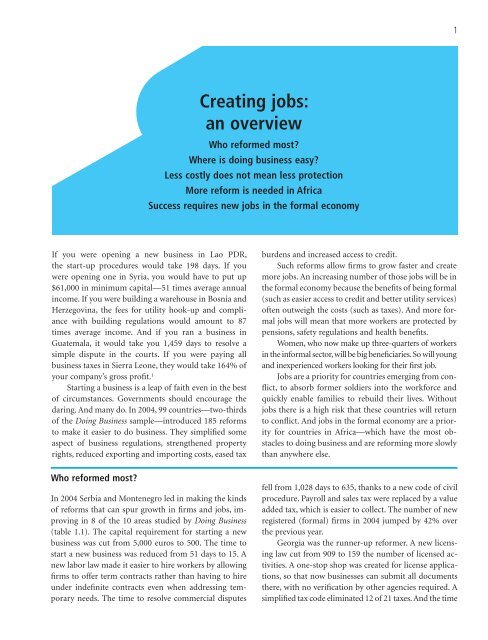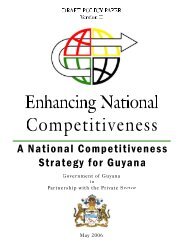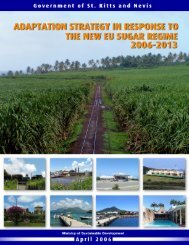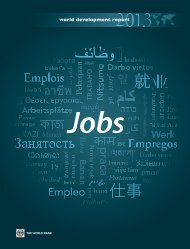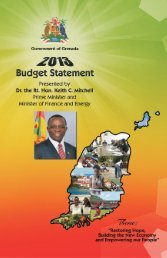Creating
Doing Business in 2006 -- Creating Jobs - Caribbean Elections
Doing Business in 2006 -- Creating Jobs - Caribbean Elections
You also want an ePaper? Increase the reach of your titles
YUMPU automatically turns print PDFs into web optimized ePapers that Google loves.
1<br />
<strong>Creating</strong> jobs:<br />
an overview<br />
Who reformed most?<br />
Where is doing business easy?<br />
Less costly does not mean less protection<br />
More reform is needed in Africa<br />
Success requires new jobs in the formal economy<br />
If you were opening a new business in Lao PDR,<br />
the start-up procedures would take 198 days. If you<br />
were opening one in Syria, you would have to put up<br />
$61,000 in minimum capital—51 times average annual<br />
income. If you were building a warehouse in Bosnia and<br />
Herzegovina, the fees for utility hook-up and compliance<br />
with building regulations would amount to 87<br />
times average income. And if you ran a business in<br />
Guatemala, it would take you 1,459 days to resolve a<br />
simple dispute in the courts. If you were paying all<br />
business taxes in Sierra Leone, they would take 164% of<br />
your company’s gross profit. 1<br />
Starting a business is a leap of faith even in the best<br />
of circumstances. Governments should encourage the<br />
daring. And many do. In 2004, 99 countries—two-thirds<br />
of the Doing Business sample—introduced 185 reforms<br />
to make it easier to do business. They simplified some<br />
aspect of business regulations, strengthened property<br />
rights, reduced exporting and importing costs, eased tax<br />
Who reformed most?<br />
In 2004 Serbia and Montenegro led in making the kinds<br />
of reforms that can spur growth in firms and jobs, improving<br />
in 8 of the 10 areas studied by Doing Business<br />
(table 1.1). The capital requirement for starting a new<br />
business was cut from 5,000 euros to 500. The time to<br />
start a new business was reduced from 51 days to 15. A<br />
new labor law made it easier to hire workers by allowing<br />
firms to offer term contracts rather than having to hire<br />
under indefinite contracts even when addressing temporary<br />
needs. The time to resolve commercial disputes<br />
burdens and increased access to credit.<br />
Such reforms allow firms to grow faster and create<br />
more jobs. An increasing number of those jobs will be in<br />
the formal economy because the benefits of being formal<br />
(such as easier access to credit and better utility services)<br />
often outweigh the costs (such as taxes). And more formal<br />
jobs will mean that more workers are protected by<br />
pensions, safety regulations and health benefits.<br />
Women, who now make up three-quarters of workers<br />
in the informal sector, will be big beneficiaries. So will young<br />
and inexperienced workers looking for their first job.<br />
Jobs are a priority for countries emerging from conflict,<br />
to absorb former soldiers into the workforce and<br />
quickly enable families to rebuild their lives. Without<br />
jobs there is a high risk that these countries will return<br />
to conflict. And jobs in the formal economy are a priority<br />
for countries in Africa—which have the most obstacles<br />
to doing business and are reforming more slowly<br />
than anywhere else.<br />
fell from 1,028 days to 635, thanks to a new code of civil<br />
procedure. Payroll and sales tax were replaced by a value<br />
added tax, which is easier to collect. The number of new<br />
registered (formal) firms in 2004 jumped by 42% over<br />
the previous year.<br />
Georgia was the runner-up reformer. A new licensing<br />
law cut from 909 to 159 the number of licensed activities.<br />
A one-stop shop was created for license applications,<br />
so that now businesses can submit all documents<br />
there, with no verification by other agencies required. A<br />
simplified tax code eliminated 12 of 21 taxes. And the time


